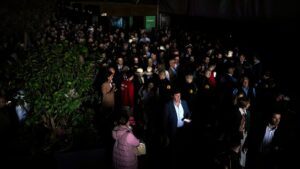WELLINGTON, New Zealand—New Zealand has long been associated with “The Lord of the Rings” but with the filming of a major new television series suddenly snatched away, the nation has become more like Mordor than the Shire for hundreds of workers.
In a major blow to the nation’s small but vibrant screen industry, Amazon Studios announced Friday it would film the second season of its original series, inspired by the books of J.R.R. Tolkien, to the U.K.
“The shift from New Zealand to the U.K. aligns with the studio’s strategy of expanding its production footprint and investing in studio space across the U.K., with many of Amazon Studios’ tentpole series and films already calling the U.K. home,” the company said in a statement.
The move came as a blow to many in New Zealand. The production is one of the most expensive in history, with Amazon spending at least $465 million on the first season, which just finished filming in New Zealand, according to government figures.
The series employed 1,200 people in New Zealand directly and another 700 indirectly, according to the figures.
“This is a shock to everyone,” said Denise Roche, the director of Equity NZ, a union representing performers. “I really feel for all the small businesses, the tech people who invested in this for the future. Nobody had any inkling.”
Roche said people feel let down by Amazon, although she added that the industry was resilient.
Amazon said the as-yet untitled series takes place on Middle-earth during the Second Age, thousands of years before the events depicted in Tolkien’s “The Hobbit” and “The Lord of the Rings” books and the subsequent films directed by Peter Jackson.
Filming began last year but was delayed due to the coronavirus. Post-production on the first season will continue in New Zealand through June before the show premieres on Prime Video in September next year.
The move to Britain comes just four months after Amazon signed a deal with the New Zealand government to get an extra 5 percent rebate on top of the 20 percent—or $92 million—it was already claiming from New Zealand taxpayers under a screen production grant.
Many locations around the world compete for productions by offering similar, generous rebates.
At the time of the deal, New Zealand’s Economic Development Minister Stuart Nash said the production would bring economic and tourism benefits to the country for years to come and create “an enduring legacy for our screen industry.”
Nash said Friday the government had found out only a day earlier that Amazon was leaving and he was disappointed by the decision. He said the government was withdrawing the offer of the extra 5 percent.
Amazon said it no longer intended to pursue collecting the extra money. But it will still walk away with at least $92 million from New Zealand taxpayers.
“The international film sector is incredibly competitive and highly mobile. We have no regrets about giving this production our best shot with government support,” Nash said. “However, we are disappointed for the local screen industry.”
New Zealand became synonymous with Tolkien’s world of orcs, elves, and hobbits after Jackson directed six movies in the South Pacific nation. “The Lord of the Rings” trilogy and “The Hobbit” trilogy combined grossed nearly $6 billion at the box office.
When Amazon Studios first announced it would film in New Zealand, it said the pristine coasts, forests, and mountains made it the perfect place to bring to life the primordial beauty of early Middle-earth.
The large ensemble cast includes Cynthia Addai-Robinson, Morfydd Clark, Ismael Cruz Córdova, Sophia Nomvete, and Lloyd Owen.
By Nick Perry





